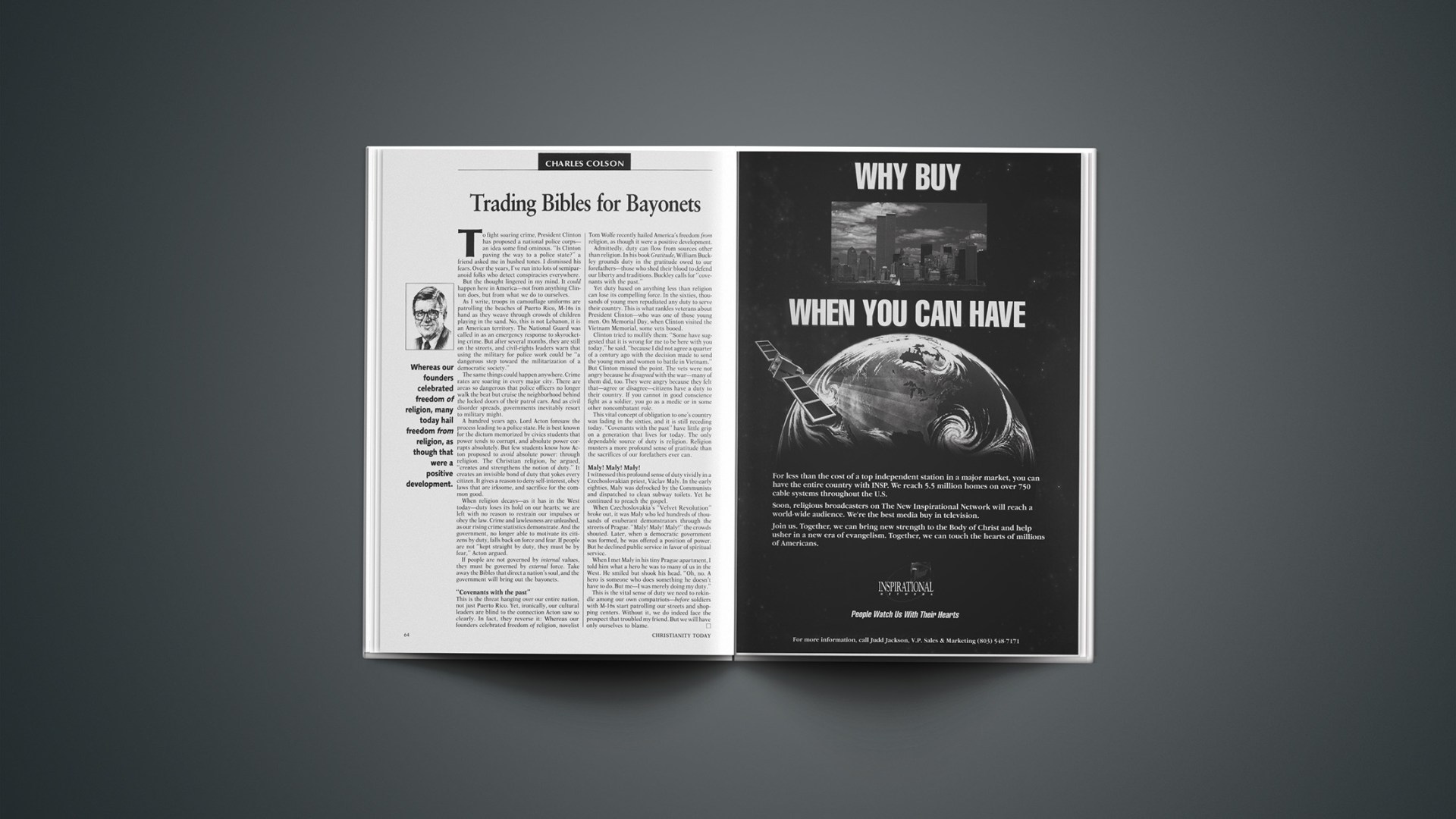To fight soaring crime, President Clinton has proposed a national police corps—an idea some find ominous. “Is Clinton paving the way to a police state?” a friend asked me in hushed tones. I dismissed his fears. Over the years, I’ve run into lots of semiparanoid folks who detect conspiracies everywhere.
But the thought lingered in my mind. It could happen here in America—not from anything Clinton does, but from what we do to ourselves.
As I write, troops in camouflage uniforms are patrolling the beaches of Puerto Rico, M-16s in hand as they weave through crowds of children playing in the sand. No, this is not Lebanon, it is an American territory. The National Guard was called in as an emergency response to skyrocketing crime. But after several months, they are still on the streets, and civil-rights leaders warn that using the military for police work could be “a dangerous step toward the militarization of a democratic society.”
The same things could happen anywhere. Crime rates are soaring in every major city. There are areas so dangerous that police officers no longer walk the beat but cruise the neighborhood behind the locked doors of their patrol cars. And as civil disorder spreads, governments inevitably resort to military might.
A hundred years ago, Lord Acton foresaw the process leading to a police state. He is best known for the dictum memorized by civics students that power tends to corrupt, and absolute power corrupts absolutely. But few students know how Acton proposed to avoid absolute power: through religion. The Christian religion, he argued, “creates and strengthens the notion of duty.” It creates an invisible bond of duty that yokes every citizen. It gives a reason to deny self-interest, obey laws that are irksome, and sacrifice for the common good.
When religion decays—as it has in the West today—duty loses its hold on our hearts; we are left with no reason to restrain our impulses or obey the law. Crime and lawlessness are unleashed, as our rising crime statistics demonstrate. And the government, no longer able to motivate its citizens by duty, falls back on force and fear. If people are not “kept straight by duty, they must be by fear,” Acton argued.
If people are not governed by internal values, they must be governed by external force. Take away the Bibles that direct a nation’s soul, and the government will bring out the bayonets.
“Covenants with the past”
This is the threat hanging over our entire nation, not just Puerto Rico. Yet, ironically, our cultural leaders are blind to the connection Acton saw so clearly. In fact, they reverse it: Whereas our founders celebrated freedom of religion, novelist Tom Wolfe recently hailed America’s freedom from religion, as though it were a positive development.
Admittedly, duty can flow from sources other than religion. In his book Gratitude, William Buckley grounds duty in the gratitude owed to our forefathers—those who shed their blood to defend our liberty and traditions. Buckley calls for “covenants with the past.”
Yet duty based on anything less than religion can lose its compelling force. In the sixties, thousands of young men repudiated any duty to serve their country. This is what rankles veterans about President Clinton—who was one of those young men. On Memorial Day, when Clinton visited the Vietnam Memorial, some vets booed.
Clinton tried to mollify them: “Some have suggested that it is wrong for me to be here with you today,” he said, “because I did not agree a quarter of a century ago with the decision made to send the young men and women to battle in Vietnam.” But Clinton missed the point. The vets were not angry because he disagreed with the war—many of them did, too. They were angry because they felt that—agree or disagree—citizens have a duty to their country. If you cannot in good conscience fight as a soldier, you go as a medic or in some other noncombatant role.
This vital concept of obligation to one’s country was fading in the sixties, and it is still receding today. “Covenants with the past” have little grip on a generation that lives for today. The only dependable source of duty is religion. Religion musters a more profound sense of gratitude than the sacrifices of our forefathers ever can.
Maly! Maly! Maly!
I witnessed this profound sense of duty vividly in a Czechoslovakian priest, Václav Maly. In the early eighties, Maly was defrocked by the Communists and dispatched to clean subway toilets. Yet he continued to preach the gospel.
When Czechoslovakia’s “Velvet Revolution” broke out, it was Maly who led hundreds of thousands of exuberant demonstrators through the streets of Prague. “Maly! Maly! Maly!” the crowds shouted. Later, when a democratic government was formed, he was offered a position of power. But he declined public service in favor of spiritual service.
When I met Maly in his tiny Prague apartment, I told him what a hero he was to many of us in the West. He smiled but shook his head. “Oh, no. A hero is someone who does something he doesn’t have to do. But me—I was merely doing my duty.”
This is the vital sense of duty we need to rekindle among our own compatriots—before soldiers with M-16s start patrolling our streets and shopping centers. Without it, we do indeed face the prospect that troubled my friend. But we will have only ourselves to blame.
Loren Wilkinson is the writer/editor of Earthkeeping in the ’90s (Eerdmans) and the coauthor, with his wife, Mary Ruth Wilkinson, of Caring for Creation in Your Own Backyard (Servant). He teaches at Regent College in Vancouver, British Columbia, Canada.










